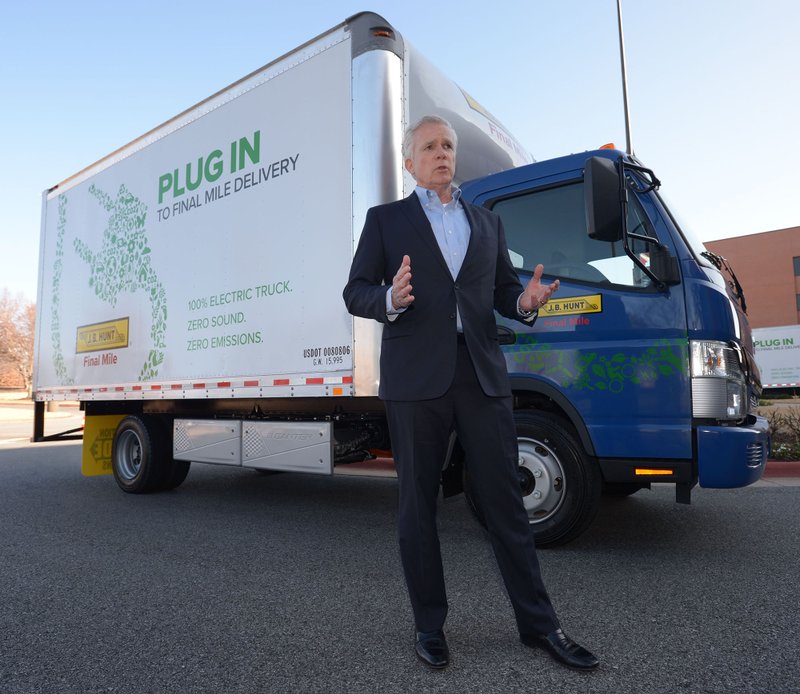In efforts to be a more energy-efficient, tech-savvy freight and logistics company, J.B. Hunt is adding five all-electric trucks to its fleet.
The short-haul electric trucks are the first of their kind to be owned and operated by J.B. Hunt. The Lowell company reserved larger all-electric tractor-trailers designed by Tesla last year.
Two of the five recently purchased FUSO eCanter trucks, made by Mitsubishi, were on display Wednesday at Hunt headquarters. Outside, Craig Harper, J.B. Hunt's chief operations officer, stood in front of the roughly 3-ton blue vehicles and said after driving one it had the feel of a golf cart.
"As soon as you put your foot on the pedal, you start having acceleration and it's a truly neat effect," Harper said. "Drivers love it. Again, it's quiet, so that's a big change to the drivers' experience. And the range, we expect to get 60 to 80 miles range on this."
J.B. Hunt plans to use the boxy, eCanter trucks to help make what the company calls "final mile" deliveries of appliances, furniture and other bulky goods for retail customers in high-density areas. Harper said "some" of them will be in Santa Fe Springs, Calif., near Los Angeles and a "couple" will be in the Houston area. He imagined the carriers making large deliveries quietly through neighborhoods.
In remarks to reporters, J.B. Hunt's President and chief executive officer, John Roberts, said the trucks may be quiet "but they speak loudly of our dedication to creating a more sustainable transportation system."
The Class-4 eCanters release zero tailpipe emissions which, according to Mitsubishi's website, eliminates the noise and carbon footprint of similar gas-guzzlers. Compared to conventional diesel models, companies save an estimated $2,000 with the eCanter for every 12,000 miles driven, or after 150 charges.
"It's going to allow us to really see how electric can play into the operation, and we'll go from there and see what other opportunities we have for electric in the future," Harper said.
While the broader trucking industry is intrigued by the electrification of heavy- and medium-duty trucks, Brad Delco, an industry analyst with Stephens Inc., said reservations remain. The trucks have their limitations, he said, citing sparse nationwide infrastructure like charging stations and the trucks relatively short driving ranges.
Diesel-powered trucks for long-haul truckers running irregular routes "would probably need a range of at least 500 miles before having a practical application for the broader trucking industry," Delco said in comparison to the 80-mile short range of J.B. Hunt's latest investment.
Delivery companies UPS and FedEx are moving at a faster pace, each adding more than 1,000 all-electric vans to their fleets for parcel delivery testing in the past year.
Despite growing pains, Harper said "most of us feel like electric is going to play a big part" in the future and "it's exciting to see it coming into the truck space."
Matthew Young, an equity analyst at Morningstar, said it's too early to know how electric vehicles will change the industry. In his eyes, diesel combustion technology is still more efficient than electric and "I don't see it changing any time soon."
"It's a nonfactor for most and a testing phase for the carriers with deep pockets," Young said about the state of electrified freight.
Mitsubishi's FUSO eCanter trucks are some of the first all-electric trucks on the market as Elon Musk's Tesla freight project languishes in development limbo. Walmart Inc. and J.B. Hunt reportedly placed orders to test out the big rigs in November 2017, when Tesla debuted the Class-8 freight vehicle with a promoted 500-mile range. At the time, Reuters reported the Bentonville retailer planned to buy 15 for operations in the U.S. and Canada. In Wednesday's news release, Hunt revealed it reserved 40 Tesla trucks that fall.
Business on 12/07/2018
